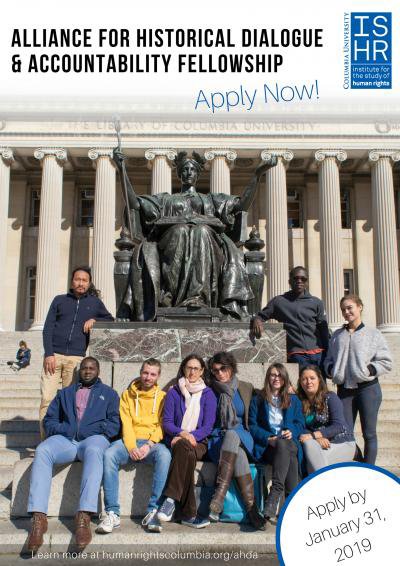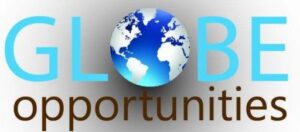
Deadline: January 31, 2019
The Institute for the Study of Human Rights at Columbia University is currently accepting applications for the Alliance for Historical Dialogue and Accountability Fellowship (AHDA).
The AHDA fellowship allows participants to come to spend the fall semester of the academic year at Columbia University in New York City. This comprehensive program provides fellows with the opportunity to hone practical skills in fundraising, advocacy and leadership; to develop a deeper understanding of and engagement with the past; and to foster mutually beneficial relationships with their peers and with international and non-profit organizations based in New York and Washington, D.C.
Fellows travel to Washington, D.C. to take advantage of the networking and advocacy opportunities available there. Fellows meet in groups and individually with relevant organizations, foundations, museums, universities and government agencies. The AHDA staff works closely with fellows to ensure that meetings are relevant to their needs and interests. The trip is also an opportunity for fellows to spend time together as a group, and to continue to learn from one another.
Seminars:
Over the course of the semester when the fellows are in residence at Columbia, they attend a series of 2-hour sessions with scholars and other experts in historical dialogue, exploring major theoretical issues and on-the-ground case studies. These seminars include discussions on the role of history, the goals of historical dialogue, and historical dialogue in different thematic and geographical contexts. Fellows develop clear concepts of historical dialogue and accountability on the basis of practical experiences and scholarly insights explored in these sessions. Continuing and active participation in the seminars, including weekly reading assignments and several short writing assignments is a requirement of the program.
Workshops:
Seminars are supplemented by capacity building trainings in skills important to the work of historical dialogue, and important to implementing a successful project. These workshops include sessions on fundraising, advocacy tools, new media, and project development. The goal of these workshops is to build capacity in a wide range of skills required for historical dialogue, from facilitation to fundraising.
Individual Projects:
During the fellowship participants design a project that addresses some aspect of a history of gross human rights violations in their society, country and/or region. Projects can take a range of forms (films, publications, curricula, reports, meetings/proceedings), with the aim of implementing them when fellows return to their home communities. Fellows will give several presentations related to the topics of their project proposals and other work that they are engaged in to members of the Columbia community and the larger human rights community in New York City. By the end of the semester, each fellow is expected to have completed a detailed proposal and budget narrative for a project in historical dialogue to a panel of fellowship reviewers, for critique and feedback.
Funding:
- Our funding ranges from:
full funding, which covers programmatic costs, living/travel expenses and includes a small monthly stipend to partial funding which covers some portion of these costs.
- In certain cases where ISHR cannot secure funding, shortlisted Fellows may be asked to secure the funds needed for them to be admitted to the program.
Eligibility:
The Program is designed for lawyers, journalists, teachers, social workers, community organizers, artists, scholars and other human rights activists working on issues related to dealing with the past such as: transitional justice, historical dialogue, memory studies, historical justice, oral history, history education.
Participants are selected on the basis of their previous work experience in work that deals with the past, their commitment to the human rights field, and demonstrated ability to pursue graduate-level studies. Full-time students will not be considered. Applicants who are mid-career and hold full or part-time jobs pursuing their advocacy efforts are preferred.
Fellows must work in the country and/or region where they live. Fluency in English is required. Fellows must provide proof of institutional endorsement in English from their organizations for their participation in the Program and must commit to returning to that organization upon completion of the Program. The program lasts a full academic semester, from late August to mid-December, and fellows are required to be in residence in New York City for this period.
For enquiries:
Please email further questions to [email protected]


